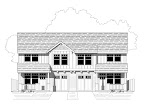Good morning fair class, and welcome back to our fourth and final installment of the Dr. Istockhouseplans economical building and planning series. Today we are going to be talking about home automation.
You might ask, "What does home automation have to do with building a house economically?" It has everything to do with it. Home automation ranges from simple wall plug-in timers all the way to smart sensors that customize your lighting and music preferences every time you enter a room. These devices will turn equipment on and off for you, especially good for lazy folks who forget to turn off lights and appliances. We are focusing more on the low end of the scale, looking at devices and techniques that will help you keep lights off more, saving money for the homeowner.
The first category to consider is that of lighting. You can buy a device in which you set a timer, plug it into the wall outlet, and then plug a lamp into it. This simple cheap device turns your light (or any other device) on and off when you choose. You can also buy switches that are mounted in a door frame. These switches are mostly used for closets and small storage areas. For larger rooms, motion detector switches are handy. If you want to sit in the room and read a book, the switch can be overridden for a time. Finally there are photo-sensitive devices that will turn your porch lights on at dusk, off at dawn.
Just because the aforementioned switches are made for lighting, you are not limited to that. If you want low-tech security, you could connect a door-frame switch to an alarm. The photo-sensitive switch could activate your sprinklers to avoid condensation loss. Or the motion detector might turn on a radio so that your music could follow you through the house.
Thermostats for your heating and cooling are already utilized.
Automatic sprinklers for your lawn are good for keeping it green, but do they need to operate if it just rained? Many manufacturers make a rain gauge that will keep your sprinklers from operating if a certain amount of moisture is already detected. You save both money and water. Animal-activated waterers will always make sure Fido has a drink when he wants.
If you want to go high-tech you might consider a computer-operated 'brain' for your house. The possibilities are almost endless, but imagine every house system being monitored for maximum performance. Maximum performance is not maximum power, it is performing at a peak level for the situation. An airflow sensor could tell you if your furnace ducts or filters are clogged; a water sensor would detect a slow leak long before you could and alert you; you could know when a light bulb was burnt out without seeing it; the phone would know when your in-laws are calling and immediately transfer them to voicemail or your spouse's cell; the microchip in your car would open the garage door the moment you come around the corner, close it when your car turns off, turn on all the lights in the house, set the thermostat to 67 and start playing your favorite tunes from the Village People.
And since all your friends and family come in the back door, the doorbell would be rung by a door-to-door salesman and immediately draw the shades, turn out the lights, and turn on the sprinklers. Home automation can be fun!
Thanks for your participation in this series of topics on planning, building, and maintaining an economically sound home. Please be sure to visit the archives section if you missed any classes, and check out the istockhouseplans website for examples and more info.
Class dismissed!
Tuesday, August 21, 2007
Subscribe to:
Post Comments (Atom)






No comments:
Post a Comment